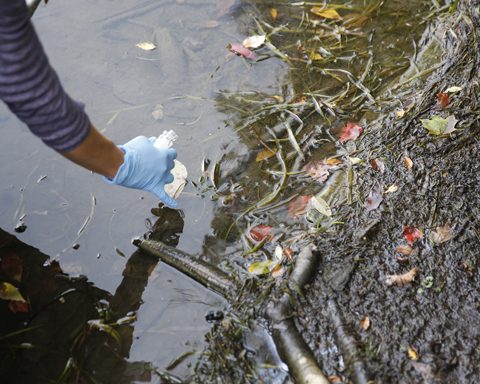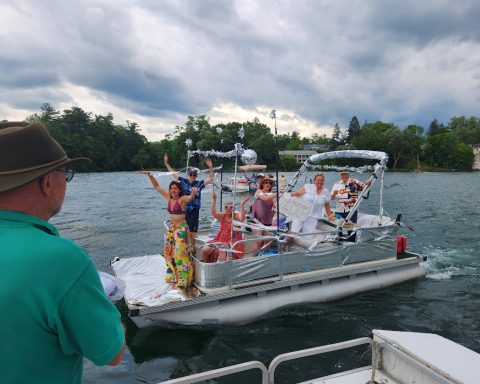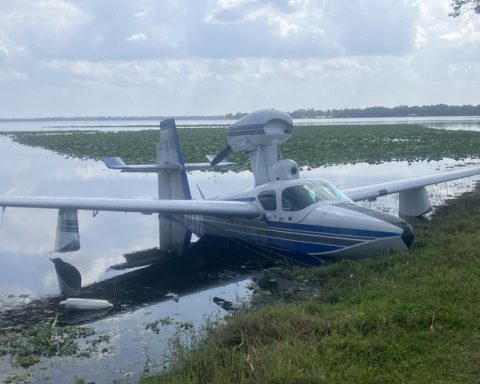Otsego Land Trust received $14,780.00 as one of this year’s 19 Preserve New York grants to fund structural analysis and condition assessment at Brookwood Point. The study will consider restoration work of the historic property and evaluate ways to improve public amenities while maintaining the “secret garden” atmosphere.…
SUNY Oneonta Biological Field Station - Page 2
The SUNY Oneonta Biological Field Station collected open water samples and water quality data from Otsego Lake on Wednesday, July 12. Colonies of microcystis, the genus of cyanobacteria responsible for the recent spate of harmful algae blooms in Upstate New York water bodies, were visible in surface waters. No cyanoHAB conditions have been documented to date.…
The Otsego Lake Association held its annual “We Love Our Lake” Boat Parade at 3 p.m. on Monday, July 3. At least 30 boats participated in the decoration contest, with many more joining for part of the route or observing from the sidelines. This year’s parade had a special guest participant, Geoff Nye, who flew in to follow the lineup in his flying boat, “The Buccaneer.”…
The Otsego Lake Association’s annual “We Love Our Lake” Decorated Boat Parade will be held at 3 p.m. on Monday, July 3rd, forming off Three Mile Point (weather permitting). This year’s parade theme is “Our Glimmerglass Shines."…
Historical Society To Lead Fairchild Mansion Tour This Saturday; Fourth of July Festival Planned; CFA, Rental Law Meet is Monday; Literacy Group Receives Grant; and more…
Letter from Chip Northrup Kudos to Canadarago Lake Communities Richfield Springs, near Canadarago Lake, is taking the lead locally on mitigating harmful algal blooms by curtailing the nutrients that are discharged from septic tanks—nitrogen and phosphorus—into the lake. We know why “the grass is always greener over the septic tank.” Toxic algae thrives in nutrient-rich water. As permitted, septic tanks discharge nutrients into the groundwater, and those fertilizers find their way into the lake where they help drive toxic algae…
BFS, Lake Organizations Announce Otsego Lake HAB Testing Strategy By WRILEY NELSONSPRINGFIELD SUNY Oneonta’s Biological Field Station announced its 2023 Otsego Lake Research and Cyanobacteria Monitoring Plan as part of the ongoing effort to study and control harmful algal blooms in Otsego County. The sampling strategy will focus on variations in temperature, nutrients, algal and cyanobacteria abundance, and toxin concentration along depth gradients in the heavily-affected north end of the lake. Additionally, the BFS has increased watershed stream monitoring and…
Biological Field Station Research Support Specialist Holly Waterfield conducts harmful algal bloom testing on Otsego Lake in Cooperstown. (Photo provided) Clark Foundation Grants Support forContinued HAB Testing by BFS ONEONTA Generous new grants from The Clark Foundation will allow researchers at SUNY Oneonta’s Biological Field Station in Cooperstown to continue to monitor and study the presence of harmful algal blooms on Otsego Lake, just in time for the summer season. Earlier this spring, The Clark Foundation Board of Directors approved…
NGOs Discuss Algal Bloom Communications By WRILEY NELSONCOOPERSTOWN Otsego 2000, Otsego Land Trust and the Otsego County Conservation Association convened a stakeholders meeting on Tuesday, May 9 to coordinate a response to harmful algal blooms. More than 30 people attended, including environmental scientists and representatives from municipalities, non-governmental organizations, volunteer groups, and county agencies. The conference was facilitated by Dr. Gina L. Keel, professor of political science at SUNY Oneonta. Attendees had extensive table discussions on messaging content and media,…
Do Blooms Also Like it Cold? Lake Superior Researcher, International Team of Scientists Help Communities Better Understand Harmful Algal Blooms By DARLA M. YOUNGS SUPERIOR, WI—Kiyoko Yokota, certified lake manager and associate professor of biology at SUNY Oneonta, co-authored a report released last week that challenges current understandings of harmful algae blooms and may help communities better prepare for them. The results of studies led by scientist Dr. Kait Reinl, research coordinator at the Lake Superior National Estuarine Research Reserve…




